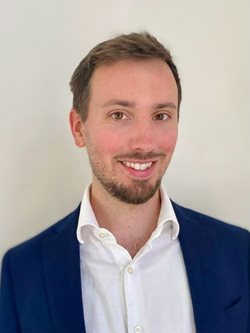ESTRO-Elekta Brachytherapy Award
Sunday 4 May | 11:20-11:30 | Strauss 3
Awardee Interview

Christopher Dürrbeck - Department of Radiation Oncology, Universitätsklinikum Erlangen, Erlangen, Germany
What have been the highlights of your career?
A difficult question with two answers for me. Firstly, there are the “milestones” that you just remember: the publication of your very first paper, the publication of the last paper of your Ph.D., the defence of your thesis. Secondly, and more importantly in my case, it is the people you meet along the way, in working groups, at conferences and in collaborations. I have had the chance to work in two groups other than my own, and seeing how others do their work, what they do similarly and what they do differently, has been super insightful and very valuable to me. Both professionally and personally, by the way.
What is your next challenge?
To encourage our industrial research partners to make electromagnetic tracking available not only in prototypes, but also in their clinical products so that all brachytherapy patients can benefit from this technology.
What do you think are the next challenges in your field?
One of the current trends in breast brachytherapy is ultra-hypofractionation. While the prospect of shortening the treatment to just two to three days is encouraging from a patient’s perspective, from a quality assurance standpoint, which I have in mind, it also means an increase in risk. There has been little discussion of the challenges of accurate dose delivery. We should bear in mind that the higher the individual doses, the more severe the effects of treatment errors like shifted catheters, swapped transfer tubes, and patient mix-ups can be. Therefore, I believe that ultra-hypofractionation should be accompanied by enhanced quality assurance to increase the error detectability, for example through electromagnetic tracking or in-vivo dosimetry.
What does the award mean to you?
We all know that researchers need to be critical, that they should always question their work and look for things that can be improved, and I guess I am no exception here. The flip side of this attitude is that, quite naturally, we tend to overlook the questions we have already answered and forget what is going well. So for me, this award is a very welcome gentle reminder that our work is meaningful and that it is appreciated by the radiotherapy community.
To whom would you like to dedicate your award?
To be honest, ‘dedicate’ is a big word and sounds to me more like the Nobel Prize or the Oscar than the ESTRO Elekta Brachytherapy Award (not to downplay it though…) So instead, let me take the opportunity to mention some of the people who have contributed in one way or another to this project: From Erlangen Christoph Bert, Michael Lotter, Stephan Kreppner, Karoline Kallis, Birte Christina Sauer, and Nadin Abu-Hossin; from Québec Isaac Neri Gomez-Sarmiento, and Luc Beaulieu; from Rotterdam Ioannis Androulakis, and Inger-Karine Kolkman-Deurloo; from Elekta Edwin Nijenhuis, Bob van Veelen, and Yury Niatsetski. Thank you all for your support!